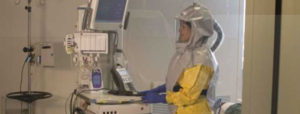
NOW Available on the PHSA LearningHub, two new education modules:
- Infection Control Precautions for Rare or Emerging Pathogens. Developed for staff working in BC hospitals (Level 1, 2, 3 facilities). LINK
- Infection Control Precautions for Rare or Emerging Pathogens (PAPR). Developed for staff working in Level 3 facilities, designated to work in biocontainment units with confirmed cases. LINK
Each health authority will communicate to its staff who needs to complete which module; at this point we are just letting you know that the modules are available.
(Please note, anyone completing the modules who may be designated to care for a patient either suspected or confirmed to have a rare or emerging pathogen will also be required to participate in hands-on training at their work site. Your manager/ supervisor should provide more information on this.)
Background: In 2016, in response to training gaps identified during Ebola preparedness in 2014, the Ministry of Health issued a Health Care Worker All Hazard Personal Protection Training Framework. The framework contains five training components. The first three components cover basic training on routine practices, point of care risk assessment, selection and use of personal protective equipment, and application of additional precautions.
These elements of the training framework were addressed by first replacing PICNet’s previous Provincial Infection Control and Hand Hygiene online education module with two new modules in 2017. Following this, two new online modules for Infection Control for Rare and Emerging Pathogens were created. These are not intended to be “stand alone” education, but the first step in a series of online and hands-on simulation practices to be completed by health authorities at specific facilities.
Current situation: The availability of these courses is timely given the evolving situation regarding Ebola Virus Disease in the Congo. From a recent Health Canada release:
- As of 27 May, 2018, the World Health Organization (WHO) reports that since the beginning of the outbreak (on 4 April 2018), a total of 54 suspected EVD cases (an increase of 3 since 20 May, 2018) and 25 deaths (case fatality rate 46.3%) have been reported. Of the 54 cases, 35 have been laboratory confirmed, 13 probable and six suspected cases. One new suspected case has been reported since May 23, 2018. The last date of reported illness onset is 21 May, 2018. As the situation is evolving, case counts are subject to change.
- A total of five healthcare workers have been affected, including four confirmed cases and two deaths.
Health Canada provides more information on its Ebola Virus Disease web page, and on its For Health Professionals sub-page. At this time the risk for international spread beyond neighbouring countries (including to Canada) is low, primarily due to the isolated location of the outbreak.